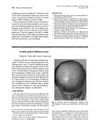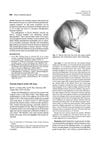 10 citations,
March 2014 in “Scandinavian journal of clinical and laboratory investigation”
10 citations,
March 2014 in “Scandinavian journal of clinical and laboratory investigation” Malondialdehyde-modified DNA may trigger an immune response in alopecia areata patients.
 10 citations,
November 2010 in “Journal of Dermatology”
10 citations,
November 2010 in “Journal of Dermatology” Longer CAG repeats in gene linked to more severe hair loss in females.
 10 citations,
January 2010 in “Acta dermato-venereologica”
10 citations,
January 2010 in “Acta dermato-venereologica” Light therapy can effectively treat vitiligo and hair loss caused by a specific medication.
 10 citations,
December 1997 in “Plastic and Reconstructive Surgery”
10 citations,
December 1997 in “Plastic and Reconstructive Surgery” Hair restoration surgery has improved with better techniques for natural looks and managing patient expectations, but it remains labor-intensive and requires careful consideration of potential complications.
 10 citations,
May 1983 in “International Journal of Dermatology”
10 citations,
May 1983 in “International Journal of Dermatology” Some people with severe hair loss saw hair regrowth after a specific light and drug treatment.
 9 citations,
August 2019 in “Journal of The European Academy of Dermatology and Venereology”
9 citations,
August 2019 in “Journal of The European Academy of Dermatology and Venereology” Minoxidil activation by hair enzymes predicts treatment success for female hair loss.
 9 citations,
October 2018 in “Journal of international medical research”
9 citations,
October 2018 in “Journal of international medical research” Frontal fibrosing alopecia is linked to hypothyroidism but doesn't affect quality of life.
 9 citations,
August 2018 in “JAAD Case Reports”
9 citations,
August 2018 in “JAAD Case Reports” Tofacitinib can temporarily improve hair growth in alopecia universalis, but its effectiveness may decrease over time.
 9 citations,
August 2018 in “Journal der Deutschen Dermatologischen Gesellschaft”
9 citations,
August 2018 in “Journal der Deutschen Dermatologischen Gesellschaft” Most patients with frontal fibrosing alopecia are middle-aged women, often have thyroid disease, and some treatments can help stabilize the condition.
 9 citations,
July 2018 in “International Journal of Dermatology”
9 citations,
July 2018 in “International Journal of Dermatology” White and yellow dots indicate severe female hair loss in dark skin.
 9 citations,
March 2018 in “JEADV. Journal of the European Academy of Dermatology and Venereology/Journal of the European Academy of Dermatology and Venereology”
9 citations,
March 2018 in “JEADV. Journal of the European Academy of Dermatology and Venereology/Journal of the European Academy of Dermatology and Venereology” Recognizing Jacquet's sign helps diagnose and treat traction alopecia accurately.
 9 citations,
January 2014 in “Annals of Dermatology”
9 citations,
January 2014 in “Annals of Dermatology” Some breast cancer patients on hormonal therapy may develop male or female pattern hair loss, which can sometimes be improved with topical treatments.
 9 citations,
November 2012 in “Hepatology Research”
9 citations,
November 2012 in “Hepatology Research” A man lost all his hair permanently after hepatitis C treatment, a side effect not seen before.
 9 citations,
November 1993 in “Journal of The American Academy of Dermatology”
9 citations,
November 1993 in “Journal of The American Academy of Dermatology” Some men can have female pattern baldness without hormonal abnormalities or signs of feminization.
 8 citations,
January 2020 in “Plastic and Aesthetic Nursing”
8 citations,
January 2020 in “Plastic and Aesthetic Nursing” The article concludes that different types of hair loss require specific treatments and psychological support is important.
 8 citations,
November 2018 in “Australasian Journal of Dermatology”
8 citations,
November 2018 in “Australasian Journal of Dermatology” Frontal fibrosing alopecia in families shows similar signs to individual cases and may have a genetic link.
 8 citations,
January 2015 in “International journal of trichology”
8 citations,
January 2015 in “International journal of trichology” A woman's total hair loss was linked to a Borrelia infection and was reversed with appropriate treatment.
 8 citations,
July 2014 in “Anais Brasileiros de Dermatologia”
8 citations,
July 2014 in “Anais Brasileiros de Dermatologia” A man's scalp condition was misidentified as hair loss dots but was actually a common follicular disorder.
 8 citations,
August 2013 in “Pediatric Dermatology”
8 citations,
August 2013 in “Pediatric Dermatology” Loose Anagen Hair Syndrome is found in black-haired Indian children and is often missed, especially in boys.
 8 citations,
January 2013 in “International Journal of Trichology”
8 citations,
January 2013 in “International Journal of Trichology” The BASP classification is effective for diagnosing pattern hair loss in Indian men and women.
 8 citations,
January 2013 in “BioMed Research International”
8 citations,
January 2013 in “BioMed Research International” Age, gender, and hair loss affect scalp characteristics differently in young Caucasian adults.
 8 citations,
June 2012 in “Australasian Journal of Dermatology”
8 citations,
June 2012 in “Australasian Journal of Dermatology” A rare form of alopecia causes hair thinning without bald spots and may be more common than thought, responding well to steroid treatment.
 8 citations,
December 2008 in “Clinical and Experimental Dermatology”
8 citations,
December 2008 in “Clinical and Experimental Dermatology” Radiotherapy was effective for treating a large scalp plaque of Bowen's disease when other treatments failed.
 8 citations,
September 2008 in “Medical Hypotheses”
8 citations,
September 2008 in “Medical Hypotheses” The paper suggests that hair loss might be caused by skull growth, not just DHT's effect on hair follicles, and calls for more research.
 8 citations,
December 1996 in “Dermatologic Surgery”
8 citations,
December 1996 in “Dermatologic Surgery” Both ASR I and ASR II are effective scalp reduction techniques, with ASR I creating finer scars and ASR II removing more bald area and reducing stretch-back.
 8 citations,
October 1989 in “Journal of the American Academy of Dermatology”
8 citations,
October 1989 in “Journal of the American Academy of Dermatology” A 5-year-old boy's seasonal hair loss is linked to his allergies.
 8 citations,
April 1979 in “Journal of Cutaneous Pathology”
8 citations,
April 1979 in “Journal of Cutaneous Pathology” Giant cells found in some male pattern baldness cases may help diagnose it and suggest hair is mistakenly seen as foreign by the body.
 7 citations,
June 2020 in “Journal of The European Academy of Dermatology and Venereology”
7 citations,
June 2020 in “Journal of The European Academy of Dermatology and Venereology” Genetic variants affect minoxidil hair loss treatment success.
 7 citations,
July 2017 in “Australasian Journal of Dermatology”
7 citations,
July 2017 in “Australasian Journal of Dermatology” Reflectance confocal microscopy is useful for diagnosing scalp melanomas, which have features similar to those on the trunk.
 7 citations,
May 2016 in “SpringerPlus”
7 citations,
May 2016 in “SpringerPlus” Some breast cancer patients on hormone therapy experience hair loss, and treatments like certain topical inhibitors and supplements may help without harming their cancer prognosis.






























